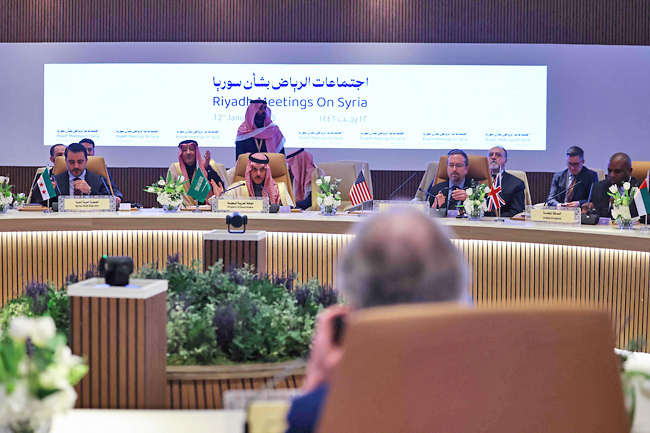RIYADH (AFP) – Top diplomats from the Middle East and Europe arrived in the Saudi capital yesterday to discuss Syria, as world powers weigh sanctions relief and push for stability after the fall of Bashar al-Assad.
The talks will include a meeting of Arab officials as well as a broader gathering that also includes Turkiye, France, the European Union (EU) and the United Nations (UN), a Saudi official told AFP.
Syria’s new leader Ahmed al-Sharaa, who led the main rebel group in the alliance that overthrew Assad, is pushing for sanctions relief. His administration is represented at the Riyadh talks by Foreign Minister Asaad al-Shaibani.
Western powers, including the United States (US) and the EU, imposed sanctions on Assad’s government over his brutal crackdown on anti-government protests in 2011, which triggered civil war.
More than 13 years of conflict have killed over half a million Syrians, left infrastructure destroyed and the people impoverished, while millions have fled their homes, including to Europe.
The US Treasury Department said last Monday it would ease enforcement on restrictions affecting essential services such as energy and sanitation.
But US officials said they will wait to see progress before any wider easing of sanctions.
The EU’s top diplomat, Kaja Kallas, said on Friday that the 27-nation bloc could begin lifting sanctions if Syria’s new rulers took steps to form an inclusive government that protected minorities. European foreign ministers are due to meet on January 27 to discuss the issue.
Possible priorities for relief include “those sanctions that are hindering the building up of a country, access to banking services and all these things”, Kallas told reporters in Riyadh yesterday.
“If we see the developments going to the right direction we are ready to do the next steps,” she said, adding there also had to be “a fallback position”. German Foreign Minister Annalena Baerbock told reporters in Riyadh that her government wanted a “smart approach” that would enable aid to reach Syrians. “Sanctions against Assad’s henchmen who committed serious crimes during the civil war must remain in place… Syrians now need a quick dividend from the transition of power,” she said, adding that Germany would provide another EUR50 million “for food, emergency shelter and medical care”.
According to the UN, seven in 10 Syrians need help.
Saudi Arabia cut ties with Assad’s government in 2012 and had long openly championed his ouster. This month the Gulf kingdom sent food, shelter and medical supplies to Syria over land and by plane.





